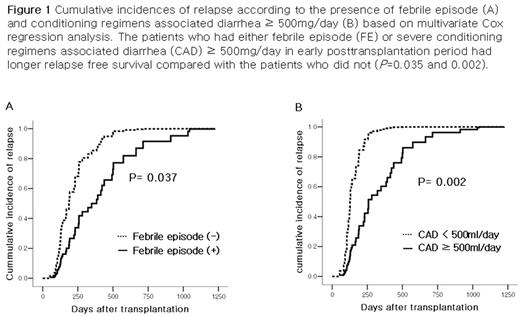Abstract
Time to relapse of acute leukemia after allogeneic hematopoietic stem cell transplantation (allo-HSCT) is variable. The relapse kinetics may be influenced by graft-versus-leukemic (GVL) reaction mediated by donor immune cells and inflammatory cytokines. We wondered if the inflammatory cytokines released during the occurrence of the early post-transplantation inflammatory events may affect GVL effect thus influencing the relapse kinetics. We retrospectively analyzed the correlation between early post-transplantation inflammatory events and relapse kinetics in 55 patients with acute leukemia who relapsed following allo-HSCT. Patients were divided into two groups, early and late-relapsed group according to the time to relapse from transplantation. Multivariate logistic regression analysis revealed that the incidences of conditioning associated diarrhea (CAD) ≥ 500ml/day and febrile episode (FE) were significantly lower in the early-relapsed group than in the late-relapsed group (P=0.046 and 0.014, respectively). Serum levels of C-reactive protein, a surrogate marker of inflammation, on day 21 after transplantation (CRP21) were significantly lower in the early-relapsed group than in the late-relapsed group (P=0.009). FE, CAD ≥ 500ml/day and CRP21 were independent predictable factors for relapse kinetics based on multivariate Cox regression analysis (P=0.037, 0.002 and 0.025; hazard ratio=0.360, 0.221 and 0.971, respectively). Our analysis indicated the inflammatory events in early post-transplantation period could delay the relapse of acute leukemia early after allo-HSCT presumably because GVL effect was enhanced with the cytokines released by the events.
Cumulative Incidences of relapse according to the presence of febrite episode (A) and conditioning regimens associated diarrhea ≥ 500mg/day (B) based on multivariate Cox regression analysis. The patients who had either febrite episode (FE) or server conditioning regimens associated diarrhea (CAD) ≥ 500mg/day in early posttransplantation period at longer relapse free survival compared with the patients who did not (P=0.035 and 0.002).
Cumulative Incidences of relapse according to the presence of febrite episode (A) and conditioning regimens associated diarrhea ≥ 500mg/day (B) based on multivariate Cox regression analysis. The patients who had either febrite episode (FE) or server conditioning regimens associated diarrhea (CAD) ≥ 500mg/day in early posttransplantation period at longer relapse free survival compared with the patients who did not (P=0.035 and 0.002).
Disclosure: No relevant conflicts of interest to declare.
Author notes
Corresponding author


This feature is available to Subscribers Only
Sign In or Create an Account Close Modal